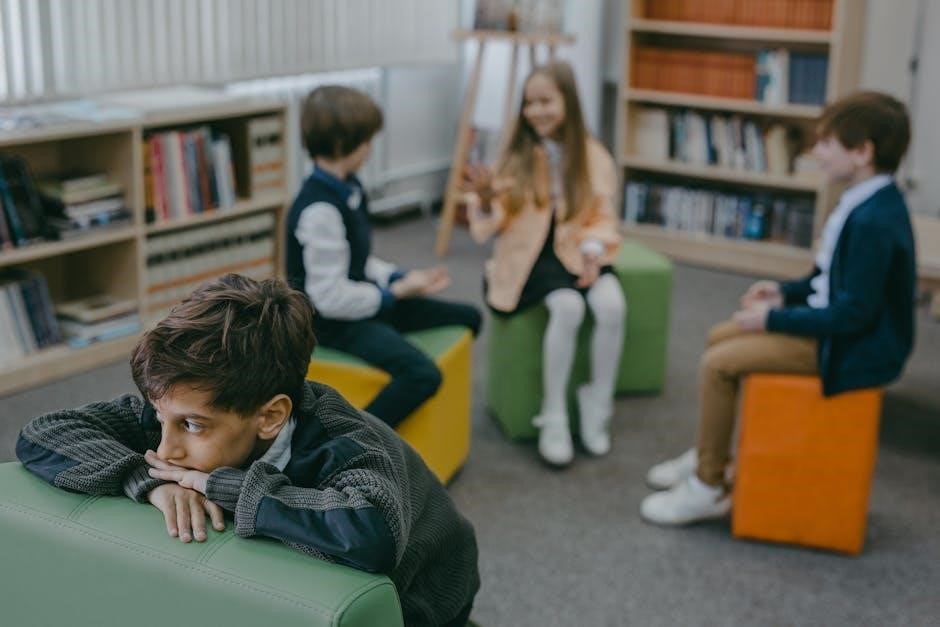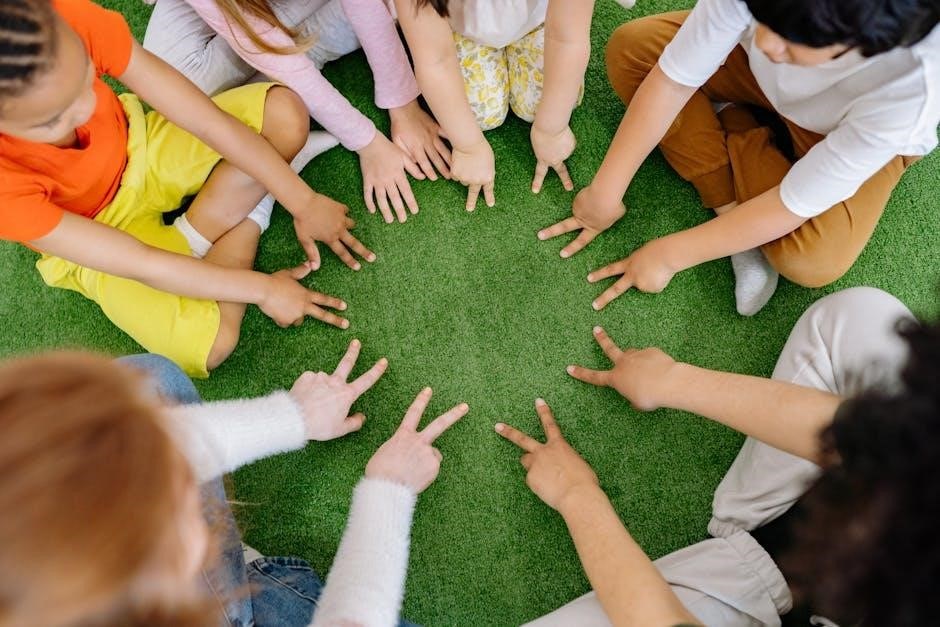Social Emotional Learning (SEL) is a crucial educational approach focusing on developing essential life skills, including self-awareness, emotional management, and interpersonal relationships, to promote personal growth and academic success.
Definition of Social Emotional Learning
Social Emotional Learning (SEL) is the process through which individuals acquire and apply essential skills to recognize and manage emotions, set goals, and maintain healthy relationships. It involves core competencies like self-awareness, self-management, social awareness, relationship skills, and responsible decision-making. SEL empowers students to navigate social dynamics, resolve conflicts, and make ethical choices. By fostering emotional intelligence and interpersonal abilities, SEL supports personal growth, academic success, and lifelong well-being. It is a cornerstone of education, enabling individuals to thrive in both personal and professional environments.
The Importance of SEL in Education
Social Emotional Learning (SEL) is vital in education as it equips students with essential skills to manage emotions, build relationships, and make informed decisions. By fostering emotional intelligence, SEL improves academic performance, enhances classroom behavior, and promotes mental well-being. It creates a supportive learning environment, reducing disciplinary issues and increasing student engagement. SEL also prepares students for future challenges, fostering resilience, empathy, and collaboration. Integrating SEL into education ensures students develop holistically, ready to succeed in both academic and real-world settings while contributing positively to their communities.
Overview of the SEL Curriculum
The SEL curriculum is structured to promote holistic student development through structured lessons and activities. It typically includes mindfulness practices, social skills training, and ethical decision-making exercises. The curriculum is designed to align with educational standards, addressing core competencies like self-awareness and relationship skills. It often integrates with academic subjects, ensuring seamless implementation. Resources such as SEE Learning and Empowering Minds provide comprehensive frameworks, offering age-appropriate content for K-12 students. These programs emphasize teacher training and ongoing support to ensure effective delivery and positive student outcomes in social-emotional growth.

Core Competencies of Social Emotional Learning
Social Emotional Learning focuses on five core competencies: self-awareness, self-management, social awareness, relationship skills, and responsible decision-making. These skills help students navigate life’s challenges effectively and ethically.
Self-Awareness
Self-awareness is the ability to recognize and understand one’s emotions, values, and strengths. It involves identifying personal feelings, acknowledging individual differences, and reflecting on thoughts and actions. Developing self-awareness helps students identify their emotional states, such as happiness, sadness, or frustration, and understand how these emotions impact their behavior. This competency also encourages students to recognize their personal strengths and challenges, fostering a growth mindset. By cultivating self-awareness, students can better navigate social interactions, make informed decisions, and develop resilience. Effective SEL curriculum incorporates activities like journaling, mindfulness, and reflective discussions to enhance self-awareness.
Self-Management
Self-management involves regulating emotions, behaviors, and thoughts to achieve personal and academic goals. It includes skills like mindfulness, self-control, and stress management to maintain focus and composure. Effective self-management helps students navigate challenges, resist impulsive behaviors, and persevere through difficulties. Techniques such as deep breathing, goal-setting, and self-monitoring are often taught in SEL curricula to enhance self-management. By mastering these skills, students can better regulate their emotions, reduce stress, and improve overall well-being, fostering a positive and productive learning environment. Self-management is essential for both academic success and long-term personal growth.
Social Awareness
Social awareness is the ability to understand and empathize with the perspectives and emotions of others. It involves recognizing social norms, diversity, and the dynamics of various social contexts. SEL curricula often incorporate activities that foster empathy, such as group discussions, role-playing, and community service. By developing social awareness, students can build stronger relationships, communicate effectively, and navigate social challenges with sensitivity. This competency also encourages appreciation for diversity and promotes inclusive behavior, creating a more harmonious and supportive learning environment for all students. Social awareness is vital for fostering positive interactions and social responsibility.
Relationship Skills
Relationship skills involve the ability to communicate effectively, cooperate with others, and build strong, positive connections. SEL curricula emphasize active listening, empathy, and conflict resolution to foster healthy relationships. Students learn to express their needs clearly, respect differing perspectives, and collaborate on shared goals. These skills are developed through interactive activities, role-playing, and group projects. By mastering relationship skills, students can navigate social dynamics, resolve disputes constructively, and maintain supportive friendships. Strong relationship skills are essential for creating inclusive environments and promoting long-term personal and professional success. They are foundational for lifelong social and emotional well-being.
Responsible Decision-Making
Responsible decision-making is a core SEL competency that equips students to make thoughtful choices. Curricula often incorporate exercises where students analyze problems, weigh consequences, and consider ethical implications. Activities include scenario-based discussions, reflective journals, and real-world applications. Students learn to evaluate information, identify biases, and prioritize well-being for themselves and others. By practicing responsible decision-making, students develop critical thinking and moral reasoning, enabling them to navigate complex situations and contribute positively to their communities. This skill fosters independence, accountability, and a commitment to ethical behavior in all aspects of life.

Frameworks for SEL Curriculum Design
Frameworks like CASEL and the Danielson Framework guide SEL curriculum development, ensuring alignment with academic goals and fostering holistic student growth through structured, evidence-based approaches.
CASEL’s Five SEL Competencies
The Collaborative for Academic, Social, and Emotional Learning (CASEL) identifies five core competencies: self-awareness, self-management, social awareness, relationship skills, and responsible decision-making. These competencies provide a framework for students to understand and manage emotions, develop empathy, build strong relationships, and make informed decisions. Self-awareness involves recognizing one’s emotions and strengths, while self-management focuses on regulating emotions and setting goals. Social awareness encourages understanding others’ perspectives, and relationship skills foster communication and collaboration. Responsible decision-making emphasizes ethical choices and problem-solving. Together, these competencies promote holistic student development and lifelong success.
The Danielson Framework for Teaching
The Danielson Framework integrates Social Emotional Learning (SEL) into teaching practices, emphasizing the teacher’s role in fostering a supportive classroom environment. It highlights components like classroom management, teacher-student relationships, and instructional strategies that promote SEL. Teachers use active listening, emotional support, and inclusive practices to encourage students’ social and emotional growth. This framework aligns with SEL goals by ensuring teachers model and teach skills like empathy, self-awareness, and responsible decision-making, creating a structured approach to holistic student development across all grade levels and subjects.
ASCA National Standards for School Counseling
The ASCA National Standards for School Counseling are designed to promote students’ social, emotional, and academic growth. These standards emphasize the development of self-awareness, self-management, and interpersonal skills through structured counseling programs. They align with SEL competencies, focusing on relationship-building, empathy, and responsible decision-making. For grades 5-8, standards address identity, friendships, and peer pressure, while K-12 frameworks integrate mental health and wellness. Evidence-based practices and collaboration with educators ensure comprehensive support, fostering a positive school climate and preparing students for lifelong success.

Illinois Social Emotional Learning Standards
The Illinois SEL standards are structured into three key goals: self-awareness, social awareness, and responsible decision-making. These goals foster emotional intelligence and social competence, preparing students to succeed in school and life.

Goal 31: Develop Self-Awareness and Self-Management Skills
Goal 31 focuses on helping students recognize and understand their emotions, values, and thought patterns. It emphasizes self-awareness, enabling students to identify their strengths, emotions, and how thoughts influence actions. This goal also fosters self-management skills, such as setting goals, managing stress, and maintaining self-discipline. Through mindfulness and reflective practices, students learn to monitor and regulate their emotions, developing resilience and a growth mindset. These skills are foundational for academic success, interpersonal relationships, and lifelong well-being, ensuring students can navigate challenges effectively and make informed decisions.

Goal 32: Develop Social Awareness and Relationship Skills
Goal 32 emphasizes fostering social awareness and relationship skills, enabling students to understand and respect diverse perspectives. It promotes empathy, active listening, and cooperation, helping students build positive relationships. This goal encourages recognizing community responsibilities and engaging in collaborative problem-solving. By developing these skills, students learn to navigate complex social environments, resolve conflicts effectively, and communicate respectfully. These competencies are vital for creating inclusive communities and fostering meaningful connections, ensuring students can interact positively with others from diverse backgrounds and contribute to a harmonious society.
Goal 33: Develop Responsible Decision-Making Skills
Goal 33 focuses on cultivating responsible decision-making skills, empowering students to make informed choices. It involves analyzing situations, considering consequences, and selecting ethical actions. This goal encourages students to reflect on their decisions’ impact on themselves and others, fostering accountability and integrity. By developing these skills, students learn to navigate complex challenges, prioritize well-being, and contribute positively to their communities. This competency is vital for fostering resilience, ethical behavior, and long-term success in personal and professional life, ensuring students become thoughtful and responsible individuals capable of making constructive decisions.
Examples of SEL Programs
Popular SEL programs include Mindfulness-Based SEL Curriculum, Empowering Minds, and Social, Emotional, and Ethical Learning (SEE Learning). These programs integrate mindfulness, ethical practices, and emotional intelligence.
Mindfulness-Based SEL Curriculum
A mindfulness-based SEL curriculum integrates mindfulness practices into social-emotional learning, fostering self-awareness, emotional regulation, and empathy. Designed for K-12 students, it includes breathing exercises, reflection activities, and mindful listening to enhance focus and emotional well-being. This approach aligns with CASEL’s framework, promoting positive relationships and responsible decision-making. By incorporating mindfulness, students develop resilience and stress management skills, creating a supportive learning environment. Research shows mindfulness-based SEL improves mental health, academic performance, and interpersonal connections, making it a valuable tool for holistic student development.
Empowering Minds: A K-8 SEL Curriculum
Empowering Minds is a comprehensive K-8 SEL curriculum rooted in mindfulness, cognitive-behavioral theory, and ethical learning principles. It emphasizes self-awareness, emotional regulation, and social skills through structured lessons and real-life applications. The program is designed to be adaptable, ensuring accessibility for diverse learning needs. By fostering a positive classroom environment, Empowering Minds equips students with tools to navigate challenges, build strong relationships, and make informed decisions. Its holistic approach supports academic success and lifelong personal growth, aligning with SEL standards and educational goals.
Social, Emotional, and Ethical Learning (SEE Learning)
Social, Emotional, and Ethical Learning (SEE Learning) is a comprehensive curriculum developed at Emory University, integrating SEL with ethical education; It focuses on cultivating values like empathy, compassion, and mindfulness alongside core SEL competencies. Designed for K-12, SEE Learning emphasizes holistic development, blending social-emotional skills with ethical reasoning. The program includes structured lessons and activities that promote self-awareness, relationship management, and responsible decision-making. By fostering a values-based approach, SEE Learning aims to create emotionally intelligent and ethically minded individuals, preparing students for academic and personal success while contributing positively to society.
Designing an Effective SEL Curriculum
Designing an effective SEL curriculum involves a structured approach, aligning with standards like CASEL and Illinois Goals, ensuring professional development, and fostering a supportive learning environment.
Best Practices for Curriculum Development
Effective SEL curriculum development involves aligning with frameworks like CASEL’s competencies and Illinois goals. Start with clear outcomes, integrate into academics, and use age-appropriate activities. Incorporate teacher training, ongoing support, and assessment tools for progress monitoring. Ensure cultural responsiveness and involve stakeholders like parents and communities. Use evidence-based programs and adapt existing resources to meet specific needs. Regular evaluation and continuous improvement ensure the curriculum remains impactful and relevant for all students.
Integrating SEL into Academic Subjects
Integrating SEL into academic subjects enhances learning by connecting emotional and social skills with core content. For example, math can incorporate problem-solving to teach decision-making, while language arts can focus on empathy through literature. Science projects can emphasize collaboration and communication. Teachers can embed SEL by using real-world, interdisciplinary challenges that require teamwork, self-awareness, and responsible decision-making. This approach not only supports academic achievement but also fosters a deeper understanding of how emotional intelligence applies to everyday learning and real-world scenarios, preparing students for future success.
Assessment and Evaluation Strategies
Evaluating SEL involves a mix of formative and summative assessments to measure skill development. Tools like self-assessments, peer evaluations, and teacher observations are used to track progress. Rubrics and portfolios help quantify intangible skills, while standardized assessments provide broader insights. Continuous feedback loops ensure tailored support, fostering growth. Balancing quantitative and qualitative methods ensures comprehensive evaluation, guiding both instruction and program effectiveness. This holistic approach supports student development beyond academics, emphasizing life skills that contribute to long-term success and well-being.
Professional Development for SEL Implementation
Professional development is crucial for effective SEL implementation. It includes teacher training, ongoing support, and collaborative planning to ensure educators are equipped to integrate SEL successfully, fostering improved teacher confidence and student outcomes.
Teacher Training and Support
Teacher training and support are vital for successful SEL implementation. Educators need foundational knowledge of SEL competencies and practical strategies to integrate them into daily instruction. Training programs often include workshops, coaching, and resources to help teachers model and teach SEL skills effectively. Ongoing support ensures teachers feel confident in addressing students’ social-emotional needs, fostering a positive classroom environment. Such support also helps teachers manage their own stress and well-being, creating a sustainable approach to SEL integration and student success.
Building a Collaborative Implementation Committee
Building a collaborative implementation committee is essential for successful SEL integration. This committee typically includes educators, administrators, and community members who share expertise and responsibilities. By fostering teamwork and shared ownership, the committee ensures alignment of SEL goals with school priorities. Regular meetings and open communication help address challenges and refine strategies. A well-structured committee not only enhances the quality of SEL programs but also promotes a collective commitment to student well-being and academic success, ensuring long-term sustainability and impact.
Ongoing Coaching and Professional Growth
Ongoing coaching and professional growth are critical for sustaining effective SEL implementation. Educators benefit from continuous support, such as mentoring and professional development workshops, to refine their SEL teaching skills. Regular feedback and reflective practices help educators adapt strategies to meet student needs. Professional growth opportunities, including peer collaboration and expert-led training, ensure educators stay updated on best practices. This iterative process fosters a culture of continuous improvement, enabling educators to model SEL competencies themselves and create a supportive learning environment for students.

The Impact of SEL on Student Outcomes
Social Emotional Learning fosters improved academic performance, enhanced mental well-being, and better attendance while reducing disciplinary incidents, creating a supportive environment for holistic student development and success.
Improving Academic Achievement
Social Emotional Learning (SEL) significantly enhances academic performance by fostering skills like attention, engagement, and effective study habits. Students develop better problem-solving abilities and critical thinking, leading to improved test scores and grades. SEL also cultivates a growth mindset, encouraging persistence and resilience in overcoming challenges. By promoting a positive classroom environment, SEL reduces stress and anxiety, allowing students to focus more effectively on their learning. These outcomes highlight SEL as a powerful tool for educators to support students’ academic success and lifelong achievement.
Enhancing Student Wellness and Mental Health
Social Emotional Learning (SEL) plays a vital role in enhancing student wellness and mental health by teaching essential life skills. SEL fosters self-awareness, emotional regulation, and empathy, enabling students to manage stress and anxiety effectively. By promoting positive relationships and a supportive environment, SEL helps reduce mental health challenges and encourages resilience. Students learn healthy coping strategies and develop a sense of belonging, leading to improved emotional well-being. SEL programs also address social and emotional challenges, equipping students with tools to navigate life’s complexities and thrive academically and personally.
Reducing Disciplinary Incidents and Improving Attendance
SEL programs significantly contribute to reducing disciplinary incidents by teaching students conflict resolution and self-management skills. This fosters a positive school climate, leading to fewer behavioral issues and improved student conduct. Additionally, SEL enhances attendance by increasing students’ engagement and motivation. When students feel supported and connected to their school community, they are more likely to attend regularly. Improved relationships and emotional well-being also reduce truancy, creating a more stable learning environment. These outcomes highlight SEL’s role in promoting both academic success and overall student well-being.
Challenges and Solutions in SEL Implementation
Common challenges include limited resources, teacher burnout, and ensuring equity. Solutions involve professional development, community partnerships, and aligning SEL with academic goals to enhance implementation effectiveness.
Addressing Teacher Burnout and SEL Needs
Teacher burnout is a significant challenge in SEL implementation, as educators often overlook their own social-emotional well-being. To address this, schools should prioritize teacher SEL training, providing mindfulness practices and stress management strategies. Professional development programs can help educators model SEL skills effectively. Encouraging collaborative planning and peer support systems also fosters a positive school culture. By addressing teacher burnout, schools ensure a sustainable and impactful SEL implementation, benefiting both educators and students. This approach aligns with best practices, ensuring educators are equipped to thrive personally and professionally.
Ensuring Equity and Inclusivity in SEL Programs
Ensuring equity and inclusivity in SEL programs requires culturally responsive practices that address diverse student needs. Schools must integrate diverse perspectives and experiences into SEL curricula to foster empathy and understanding. Professional development for teachers should include bias training and strategies for creating inclusive environments. Additionally, SEL programs should be adapted to meet the needs of students from varying backgrounds, ensuring all voices are heard and valued. By prioritizing equity, SEL programs can empower students to navigate societal challenges and promote a culture of belonging and respect.
Overcoming Resource and Funding Limitations
Schools often face challenges in implementing SEL programs due to limited resources and funding. To address this, educators can leverage free SEL curricula and tools available online, such as mindfulness-based programs and open-source lesson plans. Collaborative partnerships with community organizations and local stakeholders can also provide additional support. Federal and state grants, as well as philanthropic opportunities, are viable options for securing funding. Creative resource allocation and prioritizing SEL as a core educational component can help sustain programs despite financial constraints, ensuring equitable access for all students.
Social Emotional Learning (SEL) is essential for fostering emotional growth, academic success, and lifelong well-being. Effective implementation requires commitment, collaboration, and creative use of available resources to benefit all students.
Final Thoughts on the Importance of SEL
Social Emotional Learning (SEL) is a cornerstone of holistic education, fostering emotional growth, empathy, and resilience in students. By integrating SEL into curricula, educators empower students to navigate life’s challenges effectively, promoting academic success and lifelong well-being. SEL also supports teachers’ professional development, ensuring they can model and teach these essential skills. Its impact extends beyond the classroom, contributing to healthier relationships and communities. As schools continue to prioritize SEL, they cultivate a future where students thrive emotionally, socially, and academically, prepared to meet global challenges with confidence and compassion.
Next Steps for Implementing an SEL Curriculum
Implementing an SEL curriculum requires a structured approach, starting with teacher training and professional development to ensure educators are equipped to model and teach SEL skills. Schools should adopt evidence-based programs like Mindfulness-Based SEL or Empowering Minds, aligning with standards such as CASEL’s competencies. Collaboration between administrators, teachers, and parents is essential to create a supportive environment. Regular assessment and feedback mechanisms should be established to monitor progress and adapt strategies. By prioritizing SEL, schools can foster resilient, empathetic students prepared for future challenges.
